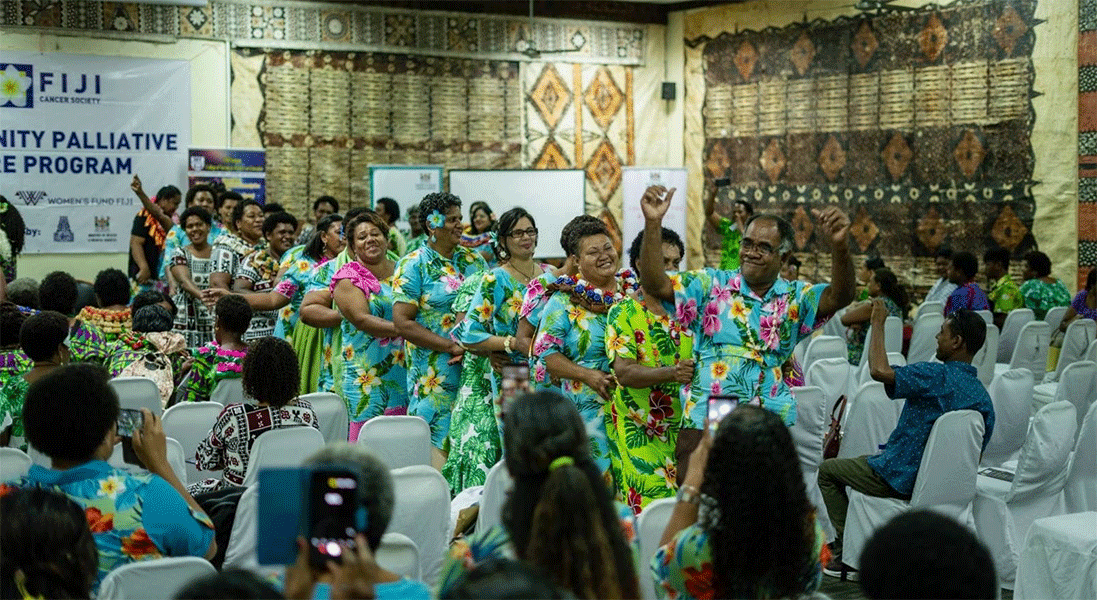66 Community Health Workers graduate from the Community Palliative Care Program
September 15, 2022

Fiji Cancer Society is excited to announce the completion of its Community Palliative Care Program in the Central division.
The Community Palliative Care Program is a collaboration between the Fiji Cancer Society and the Sangam College of Nursing to help improve the quality of life of patients suffering from cancer in terms of optimal pain/ suffering management, emotional and general support by providing holistic and integrative care palliative.
As part of the program, the Fiji Cancer Society has developed a palliative care training manual and provided training to 66 community health workers and 14 zone nurses in the central division.
Fiji Cancer Society’s Chief Executive Officer Belinda Chan said that the Society is grateful to have completed the training to community health workers in the different sub-divisions.
“This is indeed a great milestone achievement for the Society and we are glad to have seen this project come to its fruition. The Community Palliative Care Program training has allowed us to strengthen our relationship with community health workers in terms of providing the care to clients who are not only diagnosed with cancer but also with chronic disease,” Ms Chan said.
Ms Chan also acknowledged the support of the Women’s Fund Fiji through a Sustainability Grant for the implementation of the project, the Sangam College of Nursing for the technical support, and the Wellness team at the Ministry of Health & Medical Services for the continued support.
Speaking to graduates at the ceremony, chief guest and Ministry of Health and Medical Services Chief Surgeon Dr Josese Turagava reminded community health workers of the important role they play in the community. “It is my prayer that God will give you the courage to serve your communities well during the odd hours; the humility to get down and help a patient in need, and the perseverance to persist through hard times even when there is no genuine family support for immediate relatives.”
Jope Tamanikaira from Tailevu has been a community health worker for 5 years. He said it was not until undergoing the training that he learnt the step-by-step processes involved with caring for palliative care patients.
Based at the Wainibokasi Hospital, he said, “I can go back and share the learnings from the training with my colleagues, and those in the village, particularly the women’s club.”
Serailisoni Lewavututu, a community health worker for 6 years and based at the Korovou medical area in the Tailevu subdivision said prior to the training, she did not know much about palliative care or how to care for those needing support.
Having lost a loved one to cancer, Lewavututu realised the importance of knowledge acquired from the training, and has now made it her goal to extend the best support she can to those around her.
“Going back to my village, I will be more alert now. Having learnt symptoms associated with cancer patients, I will encourage people to get checked up at the nearest health centre and advise people to seek treatment early,” she said.
Fiji Cancer Society plans on expanding the program to the Northern and Western Division in the near future and revisit the different sub divisions that have completed the program. It will also organise meetings with different zone nurses to see the programs progress and also identify gaps that it can strengthen.
*FCS’s Community Palliative Care Project is implemented through a Sustainability Grant from Women’s Fund Fiji. In Fiji, most female cancer patients and survivors, including newly diagnosed cancer patients go through immense stress and social issues such as loss of self-esteem, stigma, emotional, and psychosocial crises, and with health care providers already overloaded by providing clinical services, there is a lack of supportive care which is crucial towards the patient’s pathway to holistic recovery and longevity. The Community Palliative Care Project therefore was introduced to address the lack of support for female palliative cancer patients.*
Recent press release
Victoria Yee appointed as Executive Director
April 1 2025
Leading Gender-Based Violence Awareness in Vanua Levu
March 19 2025
Rural Women’s Cooperative Unveils Strategic Plan
January 9 2025
